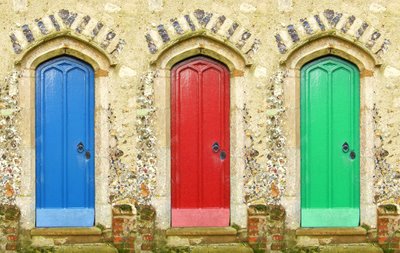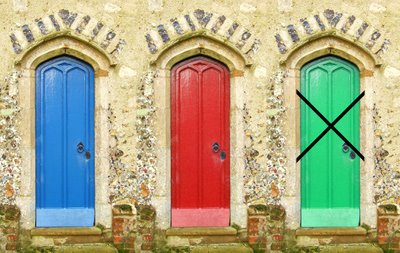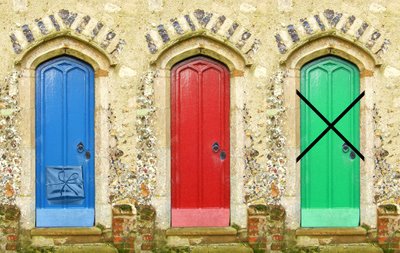In a
June 27 letter to the Science section of
The New York Times, Bruce Mansbridge (psychologist and assistant clinical professor at the University of Texas) writes:
“In a classic game-show puzzle, a contestant picks one of three doors; the host, who knows where the prize is, then opens another door to show no prize, and asks the contestant if he would like to switch his choice to the other closed door. Few switch, even though that would double the odds of winning.”

Let’s say you are a game show contestant, and you are presented with three doors, one of which hides a prize. You can choose blue, red, or green, and you choose blue, giving you one chance out of three to win.
Now the host opens the green door, revealing the absence of a prize, and offers you the chance to choose a different door. How does this change your odds of winning?

Effectively, you now have two choices, with a prize behind one of them. You can keep your blue choice, or shift to red. Thus, you now have a completely new choice, of two doors with a prize behind one of them, or one chance out of two to win. Your odds of winning have gone up, from one-third to one-half, an increase of one-sixth. Note that it is
not possible to view this choice as a two-thirds probability, no matter whether you change your choice or not.
Given that you did not choose green at the beginning, and that the contest now has entirely different starting conditions, do you double your odds of winning by taking the host up on his offer and changing your choice to red, as claimed by Dr. Mansbridge? No, you do not. Whether you change from blue to red, or not, you still have a 50% chance of winning, because you have just two doors to choose from. There is no way that this can give you a two-thirds chance to win:

The fallacy in Dr. Mansbridge’s claim comes from not understanding that once the empty green door has been revealed, the contest begins anew, and the third door is now irrelevant. You only have two doors, and you have just one containing a prize. Nothing that has gone before has any bearing whatsoever on your choice.
Photo credits:
edouardo and
bowlingranny









